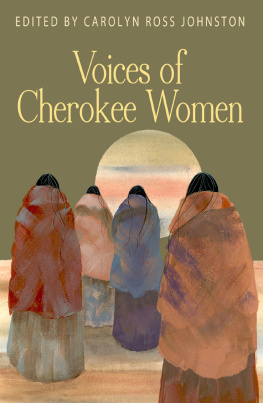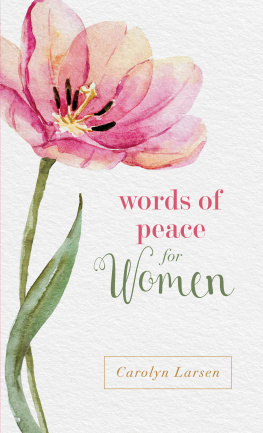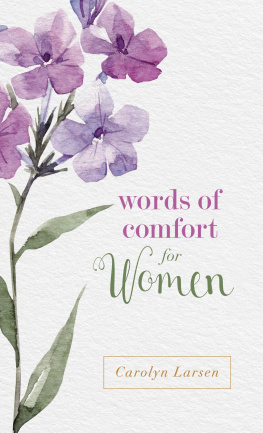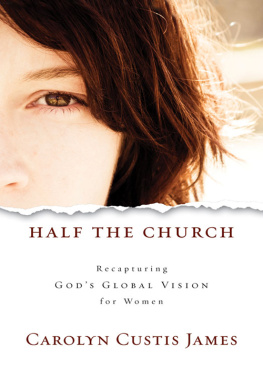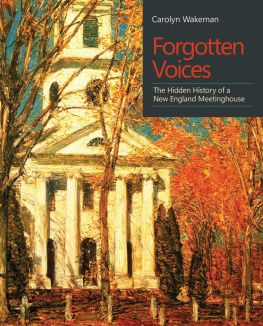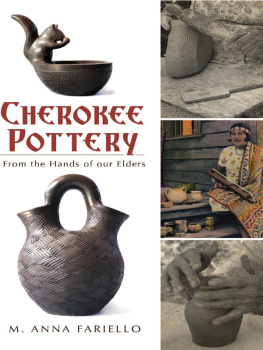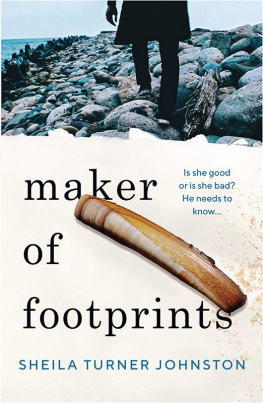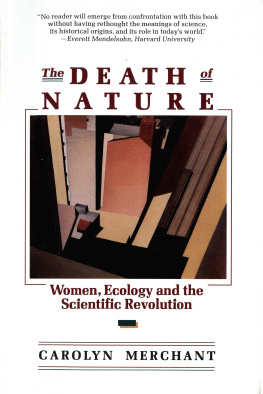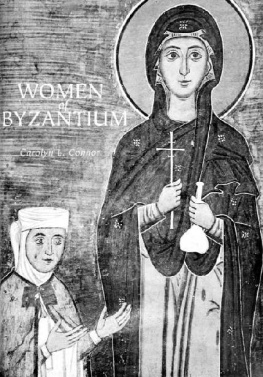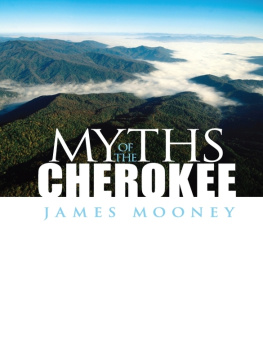Carolyn Johnston - Voices of Cherokee Women
Here you can read online Carolyn Johnston - Voices of Cherokee Women full text of the book (entire story) in english for free. Download pdf and epub, get meaning, cover and reviews about this ebook. year: 2013, publisher: John F. Blair, Publisher, genre: History / Science. Description of the work, (preface) as well as reviews are available. Best literature library LitArk.com created for fans of good reading and offers a wide selection of genres:
Romance novel
Science fiction
Adventure
Detective
Science
History
Home and family
Prose
Art
Politics
Computer
Non-fiction
Religion
Business
Children
Humor
Choose a favorite category and find really read worthwhile books. Enjoy immersion in the world of imagination, feel the emotions of the characters or learn something new for yourself, make an fascinating discovery.
- Book:Voices of Cherokee Women
- Author:
- Publisher:John F. Blair, Publisher
- Genre:
- Year:2013
- Rating:3 / 5
- Favourites:Add to favourites
- Your mark:
- 60
- 1
- 2
- 3
- 4
- 5
Voices of Cherokee Women: summary, description and annotation
We offer to read an annotation, description, summary or preface (depends on what the author of the book "Voices of Cherokee Women" wrote himself). If you haven't found the necessary information about the book — write in the comments, we will try to find it.
Voices of Cherokee Women — read online for free the complete book (whole text) full work
Below is the text of the book, divided by pages. System saving the place of the last page read, allows you to conveniently read the book "Voices of Cherokee Women" online for free, without having to search again every time where you left off. Put a bookmark, and you can go to the page where you finished reading at any time.
Font size:
Interval:
Bookmark:
VOICES OF CHEROKEE WOMEN
ALSO BY CAROLYN ROSS JOHNSTON
My Fathers War: Fighting with the Buffalo Soldiers in World War II
Cherokee Women in Crisis: Trail of Tears, Civil War, and Allotment, 18381907
Sexual Power: Feminism and the Family in America
Jack London: An American Radical?
OTHER TITLES IN THE REAL VOICES, REAL HISTORY SERIES
Before Freedom, When I Just Can Remember: Personal Accounts of Slavery in South Carolina, edited by Belinda Hurmence
Black Indian Slave Narratives, edited by Patrick Minges
Cherokee Voices: Early Accounts of Cherokee Life in the East, edited by Vicki Rozema
Far More Terrible for Women: Personal Accounts of Women in Slavery, edited by Patrick Minges
Hark the Sound of Tar Heel Voices: 220 Years of UNC History, edited by Daniel W. Barefoot
I Was Born in Slavery: Personal Accounts of Slavery in Texas, edited by Andrew Waters
The Jamestown Adventure: Accounts of the Virginia Colony, 16051614, edited by Ed Southern
Mighty Rough Times, I Tell You: Personal Accounts of Slavery in Tennessee, edited by Andrea Sutcliffe
My Folks Dont Want Me to Talk about Slavery: Personal Accounts of Slavery in North Carolina, edited by Belinda Hurmence
No Mans Yoke on My Shoulders: Personal Accounts of Slavery in Florida, edited by Horace Randall Williams
On Jordans Stormy Banks: Personal Accounts of Slavery in Georgia, edited by Andrew Waters
Prayin to Be Set Free: Personal Accounts of Slavery in Mississippi, edited by Andrew Waters
Voices from the American Revolution in the Carolinas, edited by Ed Southern
Voices from St. Simons: Personal Narratives of an Islands Past, edited by Stephen Doster
Voices from the Trail of Tears, edited by Vicki Rozema
We Lived in a Little Cabin in the Yard: Personal Accounts of Slavery in Virginia, edited by Belinda Hurmence
Werent No Good Times: Personal Accounts of Slavery in Alabama, edited by Horace Randall Williams


JOHN F. BLAIR,
P U B L I S H E R
1406 Plaza Drive
Winston-Salem, North Carolina 27103
www.blairpub.com
Copyright 2013 by Carolyn Ross Johnston
All rights reserved. No part of this book may be reproduced in any form or by any electronic or mechanical means, including information storage and retrieval systems, without permission in writing from the publisher, except by a reviewer, who may quote brief passages in a review. For information, address John F. Blair, Publisher, Subsidiary Rights Department, 1406 Plaza Drive, Winston-Salem, North Carolina 27103.
COVER
Earths Sky Jeanne Rorex Bridges
Library of Congress Cataloging-in-Publication Data
Johnston, Carolyn, 1948
Voices of Cherokee women / edited by Carolyn Ross Johnston.
pages cm. (Real voices, real history)
Includes bibliographical references and index.
ISBN-13: 978-0-89587-599-0 (alk. paper)
ISBN: 978-0-89587-600-3 (ebook)
ISBN-10: 0-89587-599-3
1. Cherokee womenHistorySources. 2. Cherokee womenHistoriography. 3. Cherokee womenBiography. I. Title.
E99.C5J618 2013
975.00497557dc23
2013022218


Se liyeni, a Cherokee medicine woman from 192627, and her son Walker Calhoun
PHOTOGRAPH SUBMITTED BY JAMES MOONEY AND FRANS OLBRECHTS; BULLETIN 99, NEGATIVE 996 D 4, NATIONAL ANTHROPOLOGICAL ARCHIVES, SMITHSONIAN INSTITUTION
CONTENTS
Members of the Cherokee Nation gathered at Rattlesnake Springs near what is now the town of Charleston, Tennessee. They had fled from their capital at New Echota in Georgia when threatened with violence and moved their council to Red Clay, Tennessee. The Indian Removal Act passed in 1830. Eight years later, the Cherokees were driven into stockades in Tennessee, Georgia, North Carolina, and Alabama. There, they awaited the long journey. They carried live coals from their final council fire.
In 1838, William Shorey Coodey described the departure of the first of the thirteen detachments to leave on the Trail of Tears:
At this very moment a low sound of distant thunder fell on my ear. In almost an exact western direction a dark spiral cloud was rising above the horizon and sent forth a murmur. I almost fancied a voice of divine indignation for the wrongs of my poor and unhappy countrymen, driven
The Cherokees carried those live coals with them all the way over the eight-hundred-mile journey to Indian Territory.When they arrived, they lit the Eternal Flame from the coals of that last council fire.
In 1984 at Red Clay, the Cherokee Nation of Oklahoma and the Eastern Band of Cherokee Indians reunited in a joint council meeting. This was the first time the two groups had come together since the removal in 1838. Representatives of the two groups lit the Eternal Flame with torches that had been ignited a few days earlier at Cherokee, North Carolina. Cherokee runners carried the torches along 150 miles of mountainous roads. Before they returned to Red Clay 146 years after their last council meeting in the East, the Cherokees had endured the Trail of Tears, the Civil War, and allotment of their lands. The live coals represented their deep commitment to Cherokee identity.
The Eternal Flame still burns.

When Cherokees met Europeans, the Europeans assumed the Cherokees were uncivilized because they were not Christians and because the women had so much power. That power was tied to their role as producers and mothers. Cherokee women were farmers and Cherokee men hunters. Their society was matrilineal and matrilocal, which meant that women owned their residences and the fields they worked. Cherokee women were wives, mothers, producers, healers, and warriors. They possessed sexual freedom and could obtain divorce without difficulty. Still, the clans maintained strict incest taboos. In all their actions, women had to take the welfare of the community into account. Cherokees believed in a sexual division of labora division associated with complementarity and equality, not hierarchy or domination.
Cherokee women lost and gained power in a variety of ways in the eighteenth and nineteenth centuries. Intended to impress the United States government and especially Georgians that the tribe was civilized and democratic, the Cherokee Constitution of 1827 disenfranchised women politically but allowed them to retain their property rights. While such political changes were strategic moves, they also stemmed from the economic shift from hunting to intensive agriculture, and from the adoption of patriarchal values by the influential Cherokees who drafted the legislation. The Cherokees even acquired African slaves. Often, their perception was that survival as a nation hinged on selective acculturation and the appearance of civilization.
The Indian Removal Act intended to remove all southeastern Indians. Resistance was fierce. Cherokee women protested, as they were more tied to the land than were men, but they were excluded from formal political decisions. No Cherokee women were lawyers, judges, or members of juries. Cherokee women still retained covert political influence, but their formal power diminished. Approximately 10 percent of the tribe at the time of removal was highly acculturated. Cherokees often intermarried with white Americans and converted to Christianity. Yet adopting European dress or language did not necessarily imply the loss of Cherokee identity and culture. Removal and the Civil War tended to reinforce older Cherokee values and beliefs, while allotment dealt a serious blow to Cherokee womens power and to tribal sovereignty.
Next pageFont size:
Interval:
Bookmark:
Similar books «Voices of Cherokee Women»
Look at similar books to Voices of Cherokee Women. We have selected literature similar in name and meaning in the hope of providing readers with more options to find new, interesting, not yet read works.
Discussion, reviews of the book Voices of Cherokee Women and just readers' own opinions. Leave your comments, write what you think about the work, its meaning or the main characters. Specify what exactly you liked and what you didn't like, and why you think so.

